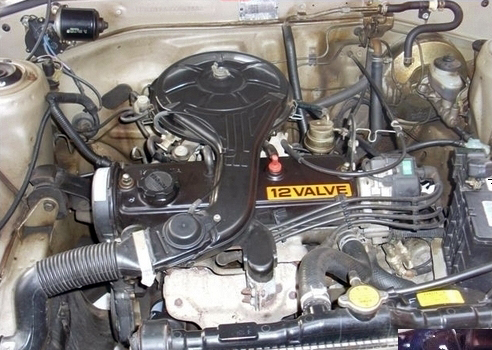High-grade Toyota Tazz Engine for Sale: Find Yours Today!
High-grade Toyota Tazz Engine for Sale: Find Yours Today!
Blog Article
Engine Purchasing Specialist Tips on Choosing the Right Engine for Your Details Requirements
Choosing the best engine for your particular demands entails an intricate interaction of elements that go past mere horsepower numbers. By delving into the intricacies of power versus performance, reviewing gas rankings, and budgeting for long-term prices, one can truly maximize their engine option.
Power Vs. Effectiveness: Locating the Equilibrium

When choosing an engine, it is vital to strike an equilibrium between power and performance to fulfill your certain demands efficiently. Power describes the engine's capacity to produce energy for propulsion, establishing elements like acceleration, towing capability, and total efficiency (Toyota Tazz Engine For Sale). On the other hand, effectiveness connects to exactly how well the engine utilizes fuel to generate power, impacting factors such as fuel economic climate and environmental friendliness
Accomplishing the ideal balance between power and performance is crucial since an engine that is also effective might take in extreme gas, resulting in higher operating expense and unneeded stress on the atmosphere. Alternatively, an engine that prioritizes effectiveness over power may lead to slow performance, particularly sought after scenarios like hauling heavy loads or driving uphill.
To make a notified decision, think about variables such as your typical driving problems, the desired usage of the vehicle, and your personal preferences. By assessing your top priorities and requirements, you can select an engine that strikes the perfect equilibrium in between power and performance, ensuring ideal performance while decreasing ecological effect and operating costs.
Comprehending Engine Dimension and Kind

Typical engine kinds include inline engines, V engines, and rotating engines, each with its distinct advantages and disadvantages. Understanding the interplay between engine size and kind is important in choosing an engine that aligns with your specific demands and priorities, whether it be power, effectiveness, or a balance of both.
Consider Your Lorry's Needs
If you are looking for an engine for a sturdy vehicle that will certainly be used for towing, you will need an effective engine with high torque capacities. On the other hand, if you are selecting an engine for a small car primarily made use of for city travelling, fuel effectiveness may be a more crucial variable to consider.

Evaluating Fuel Efficiency Scores
Evaluating gas efficiency scores is an important facet of choosing the appropriate engine for your lorry, guaranteeing cost financial savings and ecological sustainability. Fuel effectiveness scores, typically determined in miles per gallon (MPG) for gasoline engines or kilowatt-hours per 100 miles (kWh/100 miles) for electric engines, indicate just how much a car can travel on a details amount of fuel or electrical energy. Higher MPG or reduced kWh/100 miles worths symbolize more effective engines, translating to decreased gas expenses and lower carbon discharges.
When evaluating fuel efficiency rankings, consider your driving needs and routines. If you commute fars away daily, a very fuel-efficient engine can result in substantial financial savings over time. Furthermore, compare different engine choices within the exact same car class to identify the most cost-effective option. Elements such as engine dimension, weight, aerodynamics, and hybrid or electrical abilities can all influence gas performance.
Budgeting for Long-Term Expenses
Purposefully preparing for long-lasting expenses is crucial when picking an engine, guaranteeing financial sustainability over the car's life expectancy. see this While the preliminary purchase cost of an engine is a substantial factor, it is essential to take into consideration the long-term expenses connected with maintenance, fixings, and gas usage. Going with an extra fuel-efficient engine may have a higher in advance cost however can cause substantial financial savings with time. Normal maintenance, such as oil adjustments, filter substitutes, and tune-ups, is vital to maintain the engine running smoothly and effectively, lowering the threat of pricey fixings down the line.
Furthermore, investigating the schedule and expense of replacement parts for the selected engine is vital in budget planning. By meticulously budgeting for these long-lasting expenses and factoring them into the decision-making procedure, people can pick an engine that not just meets their instant demands but likewise continues to be cost-efficient throughout its life-span.
Conclusion
Finally, selecting the best engine for your certain needs calls for stabilizing power and performance, recognizing engine size and kind, considering your vehicle's demands, assessing fuel effectiveness ratings, and budgeting for long-lasting prices. By very carefully taking into consideration these variables, you can make sure that you choose an engine that meets your requirements and provides ideal efficiency for your vehicle.
To further refine the selection procedure of an engine that strikes the optimal balance in between power and effectiveness, it is vital to dive right into the details of comprehending engine size and type. Engine size refers to the total quantity pop over to this site of air and fuel that can be pressed with the engine cylinders. Common engine kinds consist of inline engines, V engines, and rotary engines, each with its unique advantages and drawbacks. Recognizing the interplay between engine size and type is vital in picking an engine that straightens with your details requirements and concerns, whether it be power, efficiency, or a balance of both.
Gas efficiency rankings, normally gauged useful site in miles per gallon (MPG) for gas engines or kilowatt-hours per 100 miles (kWh/100 miles) for electric engines, indicate how far an automobile can take a trip on a specific quantity of fuel or electricity.
Report this page